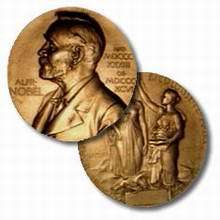October 13, 2014 report
Best of Last Week – Nobel prize winners announced, new kind of fusion reactor and a new drug that destroys tumors

It was another banner week for physics as the Nobel Prize in physics was announced—Isamu Akasaki, Hiroshi Amano and Shuji Nakamura shared the prize for their work in inventing a new kind of LED. Also, mysteriously, a team of researchers working in Australia found evidence that there is just half as much dark matter in the Milky Way Galaxy as scientists have believed.
Another team at the Joint Quantum Institute has used incoherent light to get sharp images from dull detectors—it's taking them into a fuzzy area between classical and quantum light. And, the discovery of a new subatomic particle is shedding light on the fundamental force of nature—researchers with the University of Warwick found the particle (dubbed Ds3*(2860)) using the Large Hadron Collider. They believe it will "transform our understanding" of the fundamental force of nature that binds the nuclei of atoms.
In applied applications, a team of engineers at Washington University has come up with a design for a fusion reactor that could be cheaper than using coal—they claim scaling it to the size of a coal plant would make the plant economical. Meanwhile another team of researchers has come to the conclusion that there are only four unique city topologies—they used data from OpenStreetMap and mathematics to come to this conclusion.
Also, some good news came from a combined team of researchers looking into the mechanism that underlies diabetes—they've actually discovered a "good" fat that fights diabetes—a new class of molecules that appears to protect both mice and humans from the onset of the debilitating disease. And in an interesting bit of research, a team of scientists has traced the evolutionary history of Arctic bacteria and in so doing, have found a long evolution of toxic mercury resistance—a finding that could have implications on research that involves looking for life on other planets.
And finally, researchers at QIMR Berghofer Medical Research Institute announced that they've found a cancer drug that destroys tumors in pre-clinical trials—it's still preliminary work, but the implications are staggering—imagine if doctors could actually destroy cancer tumors with a simple drug made from the seeds of a rainforest plant.
© 2014 Phys.org



















